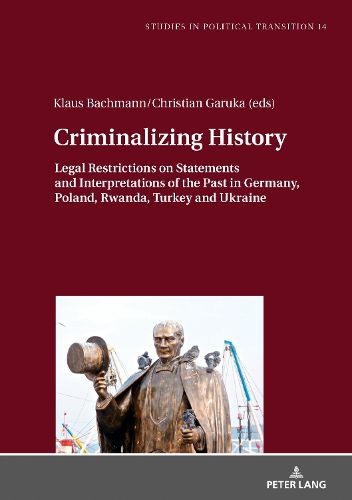Readings Newsletter
Become a Readings Member to make your shopping experience even easier.
Sign in or sign up for free!
You’re not far away from qualifying for FREE standard shipping within Australia
You’ve qualified for FREE standard shipping within Australia
The cart is loading…






This title is printed to order. This book may have been self-published. If so, we cannot guarantee the quality of the content. In the main most books will have gone through the editing process however some may not. We therefore suggest that you be aware of this before ordering this book. If in doubt check either the author or publisher’s details as we are unable to accept any returns unless they are faulty. Please contact us if you have any questions.
Why do states ban certain statements and interpretations of the past, how do they ban them and what are the practical consequences? This book offers an answer to these questions and at the same time examines, whether the respective legislation was supply-or demand-driven and how prosecutors and courts applied it. The comparison between Germany, Poland, Ukraine, Rwanda and Turkey offers several surprising insights: in most countries, memory law legislation is supply driven and imposed on a reluctant society, in some countries they target apolitical hooligans more than intellectuals or the government’s political opponents. The book also discusses, why and how liberal democracies differ from hybrid regimes in their approach to punitive memory laws and how such laws can be tailored to avoid constraints on free speech, the freedom of the press and academic freedoms.
$9.00 standard shipping within Australia
FREE standard shipping within Australia for orders over $100.00
Express & International shipping calculated at checkout
This title is printed to order. This book may have been self-published. If so, we cannot guarantee the quality of the content. In the main most books will have gone through the editing process however some may not. We therefore suggest that you be aware of this before ordering this book. If in doubt check either the author or publisher’s details as we are unable to accept any returns unless they are faulty. Please contact us if you have any questions.
Why do states ban certain statements and interpretations of the past, how do they ban them and what are the practical consequences? This book offers an answer to these questions and at the same time examines, whether the respective legislation was supply-or demand-driven and how prosecutors and courts applied it. The comparison between Germany, Poland, Ukraine, Rwanda and Turkey offers several surprising insights: in most countries, memory law legislation is supply driven and imposed on a reluctant society, in some countries they target apolitical hooligans more than intellectuals or the government’s political opponents. The book also discusses, why and how liberal democracies differ from hybrid regimes in their approach to punitive memory laws and how such laws can be tailored to avoid constraints on free speech, the freedom of the press and academic freedoms.